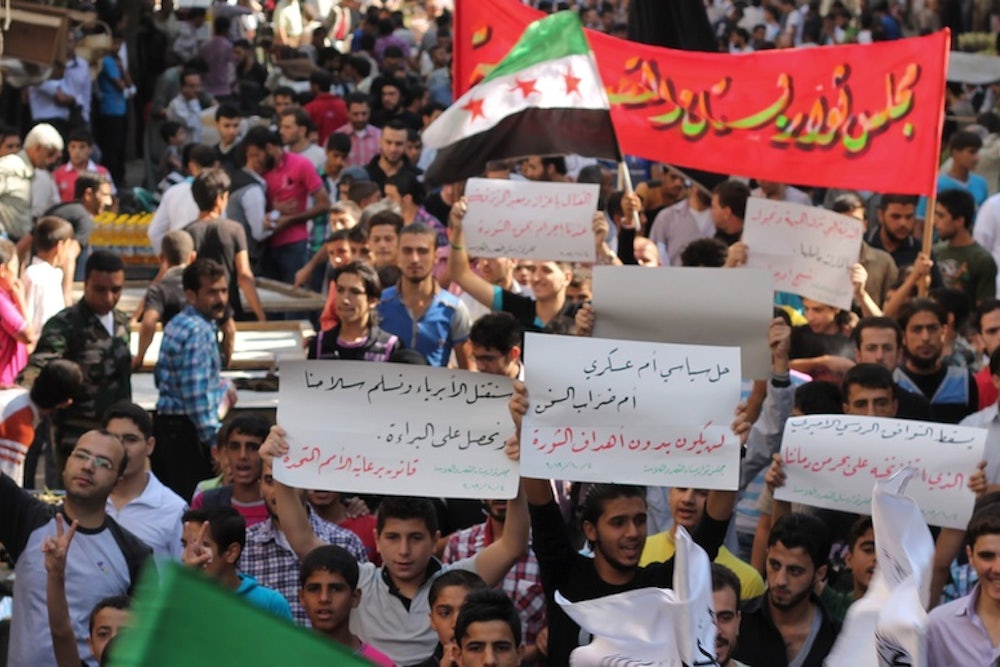The Syrian city of Aleppo briefly regained access to the Internet yesterday, ending an information blackout that lasted well over a month. As of this afternoon, though, it looks like the city is back offline. During the brief window of access, people on the ground issued celebratory tweets even as fighting continues in the city, one of the main battlegrounds of Syria's civil war. The information intelligence company Renesys broke the news after noticing a new connection between a Turkish telecom router and four Syrian networks, two of which are Syrian state telecom (STE) networks. “All of this points to an orderly coordination involving STE and thus the blessing of the Syrian government,” wrote Renesys senior analyst Doug Madory.
The Syrian government has repeatedly deployed this tactic as an effort to quell protests. Information blackouts have been going on since fighting broke out in 2011. The most recent blackout in Aleppo may have been, in fact, imposed by rebel forces, but the motivation is the same: Shutting off communications is supposed to be a fast way to disempower and control a population, and to prevent people from organizing on Facebook or Twitter. Other countries in the region seem to think along the same lines: Egypt notoriously disabled Internet and cell communications in an attempt to dampen the Tahrir Square protests in 2011; Myanmar gave it a shot in 2007 and then again in 2011; Sudan imposed a 24-hour Internet blackout last month to try and extinguish riots in Khartoum; Iran, which blocks Facebook and Twitter, has long been working toward disconnecting from the open web in order to “protect” the population from cyber attacks, or, perhaps, revolution.
But according to Yale’s Navid Hassanpour, who has been studying communications disruptions in the Middle East since 2011, these blackouts are actually more likely to strengthen and spread protests rather than extinguish them. He calls it the “dispersion effect”: unable to get information online or on the phone, people are more likely to take to the streets themselves to find out what’s going on, even if they are removed from the center of the conflict. “Anxiety has something to do with action,” Hassanpour explains. “It makes you connect with people in your proximity, and generates local centers of contention.” As a result, conflict sites proliferate.
Such was the case during the Tahrir Square revolution, when the communications blackout coincided with a significant increase in the geographical dispersion of protests:
Top: Protest Dispersion in Cairo (Number of Distinct Protest Locations reported in The New York Times), Bottom: All Google Products, Egypt Traffic, from N. Hassanpour, Media Disruption and Revolutionary Unrest: Evidence from Mubarak’s Quasi-Experiment.
The same thing happened in Syria last year, when the Assad regime imposed a blackout across the country to try and defeat rebel attempts to gain control of the Damascus airport.
Top: Conflict dispersion in the Damascus area from 11/26/2012 to 12/04/2012. Note the increase and decline immediately before and after the blackout period 11/29-12/01. Source: Institute for the Study of War (ISW), Damascus Conflict Location Dataset. Bottom: A depiction of full Internet disruption on November 29, 2012, Google services, fraction of worldwide traffic, normalized, source: Google Transparency Report http://goo.gl/5sNjN. From: "Communication Disruption and Civil Conflict in Syria, A Case Study,” Global Censorship and Access to Knowledge: International Case Studies, edited volume by Yale's Information Society Project.
Instead of petering out, the number of conflict sites in Damascus increased and spread well beyond their initial location in the city:
View Damascus conflict locations-11/30/2012 in a larger map
In a 2011 paper on the Tahrir Square case, Hassanpour makes a point of explaining that this is also a historical trend; for example, the largest protest of the 1979 Iranian revolution occured when newspapers were on strike, forcing people to get the news through pamphlets, audio cassettes, and other means of person-to-person communication.
In Syria, past Internet blackouts have coincided with developments in the civil war; during one of two country-wide blackouts in May, the timing coincided with news of an impending U.N. resolution condemning the Assad regime, as Mashable pointed out. The Aleppo blackout spanned the duration of the U.S.-Russia negotiations to destroy Syria's chemical weapons. In order to access the Internet, some Syrians have relocated to opposition-controlled parts of the city that have a signal, and some have moved to the port city of Latakia, according to a report last week from Al Akhbar. In Aleppo itself, the conflict rages on as both rebels and government forces have made gains in the area this week.
From the way things look it seems clear that the disruption of communications isn't helping either side. And it's a safe bet that this won't be the last Internet blackout in Syria—as Hassanpour put it, "the off switch is very tempting."
